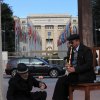
بیانیه های سازمان دفاع از قربانیان خشونت در اجلاس 24شورای حقوق بشر
بیانیه های سازمان دفاع از قربانیان خشونت در...
بیانیه های سازمان دفاع از قربانیان خشونت به زبان انگلیسی است.
Item 3: General Debate: Contradiction of uni and multilateral sanctions with Right to Development principlesFor the preservation of human dignity and preservation and bringing about the conditions for a decent life, people have the right to through proportionate - not necessarily equal - enjoy the conditions. With this in mind, the ODVV believes the imposition of unilateral and multilateral sanctions is the blatant violation of the right to development. We believe that sanctions quickly destroy the political, economic, social, cultural and civil infrastructures of a healthy society, and this is in the event that the true reasons behind sanctions, are more political nature than being legal, which will have more destructive effects.
The severest unilateral and multilateral sanctions have been imposed on the Iranian people in the recent years. Despite the claims of America and Europe, these sanctions are anything but targeted, but without any distinction, have put immense pressure on ordinary people in order to force a regime change through increasing social discontent and dissatisfaction. According to articles 3 and 9 of the Human Rights Council Resolution 32 of 2012, the imposition of any form of coercive unilateral economic pressure for the purpose of regime change of a UN member state is prohibited. But the release of four sanctions documents against Iran just in 2011 alone, and also another 5 in the previous year by the United States is an unprecedented record in the last three decades. Unfortunately Europe faithfully follows this method.
As a nongovernmental organization based in Iran we see the pain and suffering of our citizens directly as a result of these human rights violating sanctions, and call upon the Council to adopt a practical measure in the form of a resolution or raising of the issue in the Council, and review the negative repercussions of sanctions, and prevent the use of these tools for forcing political pressure on countries.
................................................................................................................................................................................
Item 4: Human Rights Situation in SyriaMr. President,
There is no reliable evidence in history that the conducting of “swift and surgical” campaigns by foreign forces have brought peace and calm to a country; particularly in the long run.
Violence is condemnable, regardless of it being committed by the Syrian government or the rebels. Let us look at the statistics recently released by the London based Syrian Observatory for Human Rights, according to which 43.2 percent of the almost 100,000 people killed in the Syrian 2 year conflict were government forces and supporters.
Since 2001 the world has been paying atonement to extremist groups who at first had been equipped by western countries with short term political intentions, which later became a great global problem. The most highlighted of these groups which are involved in fighting the Syrian government are Al Nussrat and the Islamic State of Iraq and the Levant groups, which are Al Qaeda affiliated, and they even implement Taliban style laws in regions under their control.
Mr. President,
This conflict has spilled into neighboring Iraq and Lebanon. Any miscalculated political and military actions will only embolden and strengthen terrorism, violation of human rights and extremism, and more extremist fighters will pour into the country. We reiterate that no war in history has spread human rights. NATO intervention in the Kosovo conflict caused the escalation of the ethnic cleansing of both sides of conflict. NATO’s intervention in Libya too resulted in the opponents of Gadaffi to settle scores with the supporters of the previous regime. This is the same thing that’s taking place in Mali.
Mr. President,
The best and lasting way to return the Middle East to calm, is to give diplomacy the chance that prepares grounds for participation of all key players and also seriously pursue the establishment of a region void of WMDs.
........................................................................................................................................................................................
Item 6: Necessity for the redefinition of the importance of the UPR mechanismMr. President,
The UPR mechanism is one of the most invaluable and sustainable tools that the international community has designed for the protection and promotion of human rights. The universality of this mechanism all governments in turn are both observers and are observed, and also the effectiveness power of all the actors - governmental and nongovernmental - in the improvement of human rights around the world are increased, are some of the positive aspects of the UPR mechanism.
It was hoped that this process would gently replace confrontational procedures such as the old releasing resolutions and "naming and shaming" mechanism. It was hoped that the international community's look at the human rights situation of a country would be in the form of a full package, that every four and half years would be given to the country and they get asked to remove their human rights problems in between two rounds by the use of the recommendations provided. The United Nations and the rest of the States were supposed to assist the State under review with a cooperative and conciliatory approach. And help reach human rights high values.
Nevertheless unfortunately not only the universality of UPR has lost its functionality over a period of time, but the strengthening of procedures based on resolutions and increasing pressures from other Council monitoring mechanisms, has also added to further undermine the effects of the UPR. Another new development is that over the last two years the volume of the open letters written by special rapporteurs, individual or collective, to put media pressure on some countries have increased. Letters that are influenced by weak and strong media contents increase or decrease. In fact it seems that in most cases, instead of the rapporteurs making the flows and take the media with them they are thrown around side to side by the media waves.
The ODVV believes the worth and value of the UN's and this Council's human rights monitoring mechanism must be preserved, and must do their utmost to move in the framework of the same package approved by the Council, i.e. the UPR mechanism. This way, over time we shall witness the return of the real worth of the UPR.
..........................................................................................................................................................................................
Item 7: Human Rights in Palestine and Other Occupied TerritoriesMr. President,
Human rights violation cases against Palestinians in Occupied Territories rise in number each year. On one hand in pursuit of its interests and objectives, Israel targets international organizations with lobbying and its influence, and on the other hand, not only does it not implement international human rights principles and laws, but it acts contrary to them, and is recognized as one of the most certain violators of human rights. The deliberating point with regards to Israel’s human rights violations is the condemnations that it receives from international organizations, particularly the Human Rights Council. In spite of these condemnations, Israel continues to violate human rights.
According to human rights organizations’ reports, in the first six months of 2013, the IDF abducted 1719 Palestinians and shot dead another 16. There were approximately 4800 Palestinian inmates in Israeli prisons, 236 of which were children.
Also in 2012, the IDF killed 290 Palestinians, 170 of which, including 49 children, were killed in the November military attack on Gaza, and 1400 left injured, 439 of which were women and children. Also in the same year 12 Palestinians were killed in the West Bank. It is unfortunate that in actions contrary to Article 3 common to the Geneva Four Conventions with regards to the necessity to protect civilians during war and also humanitarian law contents, Israel does not distinguish between combatants and civilians.
The illegal settlements construction by Israel in the Occupied Territories is another clear violation of human rights committed against the Palestinians, which despite the protests of most countries and international organizations, Israel has not stopped.
Mr. President,
We call upon international organizations and institutions to while condemning the cases of blatant violations of human rights committed by Israel, to facilitate prevention solutions and show legal and international reaction towards Israel's grave violation of human rights.
.....................................................................................................................................................................................................
Item 9: Islamophobia Mr. President,
Islamophobia can be defined as a view based on groundless hatred of Islam and Muslims, which results in their isolation, deprivation, discrimination and verbal, written and practical abuse committed against them. The roots of this view existed prior to 9/11, and therefore the assumption that Islamophobia is solely the direct and sole product of these attacks is foolish and unreal. Also reducing it down to racist tendencies of the west's extremist groups is also invalid.
Nonetheless, alongside Islamophobia there is another creeping disaster called sectarian tension on the rise, particularly in the Middle East region. On this basis, over the recent months, particularly in turbulent regions such as Syria, Iraq and Egypt, where there's been a notable rise in the large volume of sectarian attacks have been committed by religious extremists against Christian and particularly the Shia minorities. In fact after years of the turning of the blind eye of international organizations, the historic efforts in the marginalization of the Shia in the regional countries, have now turned into the official policies of religious extremists and a number of regional countries in the Middle East.
Mr. President,
Shiaophoic mentality and actions in the Middle East is on the rise. The conditions of the Shia minorities in Iraq, Pakistan, Saudi Arabia, Syria, and the Shia majority in Bahrian, require the serious attention of this Council.
We believe that if international human rights institutions resolutely and timely take suitable measures against any form of religious extremism, then the roots of these problems will be eradicated both in the Middle East and the West. The UN's failure for timely, real and not a formality concentration on dialogue among civilizations and religions, and also failure in resolute confrontation with any form of religious defamation and not clarifying the boundaries between freedom of expression and defamation, all resulted in many of these dormant trends to rejuvenate again. If nothing is done about these today, tomorrow shall be too late.
 بازآوری
بازآوری


